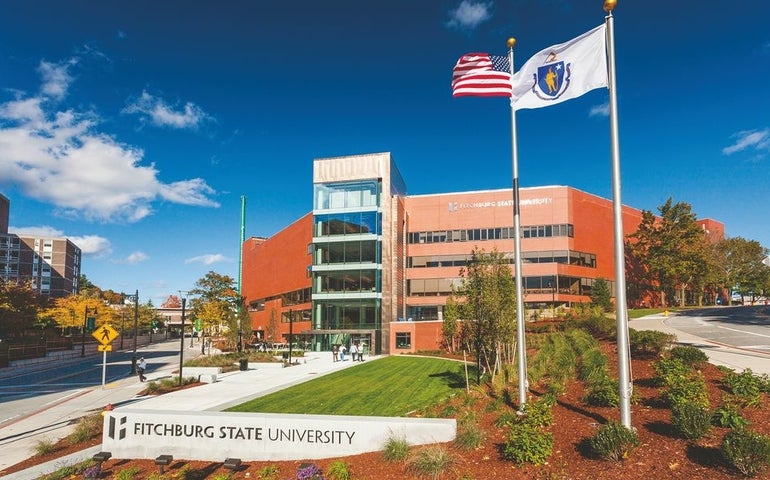Applications for MBA programs across the country fell 7 percent between 2017 and 2018, according to the Graduate Management Admissions Council, a global association of graduate business schools.
The decline is not a new story for graduate-level business programs, particularly traditional ones. Over the past three years, a majority of full-time, two-year MBA programs in the U.S. have seen declining applications.
To fight this national dip, local colleges and universities approach the needs of potential MBA students in new ways.
Fitchburg State University saw a similar 7-percent decline as the national trend from 2017 to 2018, but that one-year figure belies the surge in growth since 2016, as MBA applications jumped from 172 two years ago to 366 a year later. The growth has come almost entirely from the university’s online MBA program, which now enrolls 900 students, compared to 75 who attend class on campus.
“The market that we’re reaching out to tends to be working professionals who cannot take that time off and do in-person programs,” said Alberto Cardelle, vice president of academic affairs at FSU. “Focusing on skills that they can acquire online gives them a credential that will help them move up in their current jobs.”
Nichols College in Dudley has grown its MBA program an average of 40 percent annually over the past five years thanks partly to a slightly different use of technology.
“We went to something we call high-flex,” said Kerry Calnan, executive director of graduate and professional studies at Nichols.
The idea, Calnan said, is students can do some of the coursework at home whenever they have time, but there are 90-minute live classes each week. Students can either show up on campus for these sessions or, if they’re stuck at the office, connect remotely from there.
“You can choose week-to-week if you want to drive to campus and participate,” she said.
Assumption College in Worcester offers an option where students attend classes twice a month and work online the rest of the time.
“What we’re finding is students today want flexibility,” said Robin Frkal, director of Assumption’s MBA program. “They don’t want to give up the in-person educational experience – every student I talked to finds so much value in the interactions they have with the professors and other students that they get in a classroom experience.”
Finding the right kind of student
All three schools said they serve students in a range of career situations. But Frkal said Assumption has found success in recent years with a program geared specifically to new graduates. The college’s one-year accelerated MBA targets people who’ve decided to stay in school after completing a bachelor’s degree. The idea is early-career professionals who may not yet have family commitments are often willing to sacrifice a year of work at a starting salary to enhance their options when they do hit the job market.
“Just like at one point a bachelor’s degree was the gold standard, as we are becoming more and more competitive in the marketplace an MBA is seen as a necessary degree,” Frkal said. “If they spend one year and they complete their MBA degree it may open up doors for them.”
As the national decline in applications suggests, MBA programs face a certain level of headwinds. That’s partly because the economy is strong, which can make it easier for many professionals to focus on their jobs rather than retooling to become more competitive.
But Assumption has found the strong economy can work in its favor. Frkal said the college is increasingly marketing to employers rather than just potential students.
“We can partner with firms to use education as a benefit that helps to attract and retain their talent,” she said.
Finding the right fit for businesses
FSU has seen increased interest in its MBA program among employers including local credit unions and hospitals. Some offer reimbursement to workers for continuing their education, or seek out interns from the program.
“We’re seeing a lot of small to medium-sized companies that are becoming learning institutions,” said Keith Williamson, dean of business and technology.
Ties with local business are crucial for all three MBA programs. With hospitals and other health providers as a crucial part of the Central Massachusetts economy, Assumption launched a healthcare-oriented concentration, and FSU is considering a similar move.
Nichols created an external advisory board made up of corporate leaders to help ensure its students were receiving the kind of education that would make them attractive as employees. In response to employers’ needs, Calnan said, it has expanded its focus on soft skills, conflict resolution and leadership development, supplementing more traditional MBA components like finance and strategic management.
Despite the national decline, Frkal said, MBAs continue to appeal to many students looking for a practical path to career success. For example, Assumption’s accounting track provides the credits students need – above and beyond what they receive in a bachelor’s program – to receive a CPA license. Students can focus specifically on areas like marketing, banking or operations. But, Frkal said, the bottom line is, regardless of industry, an MBA prepares professionals to find their place helping whatever business they work for to thrive.
“When you graduate with an MBA, you understand all the functions of business operations,” she said.

